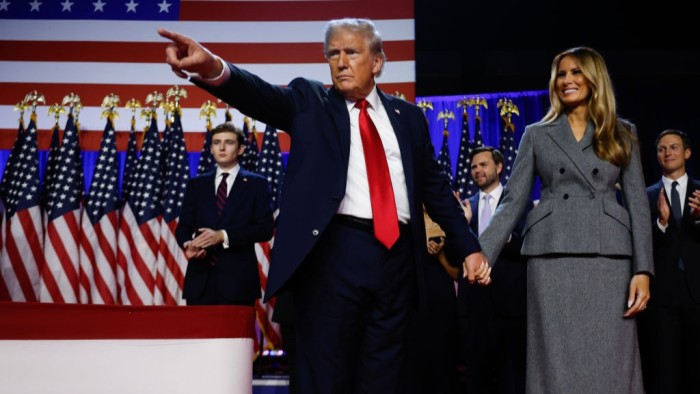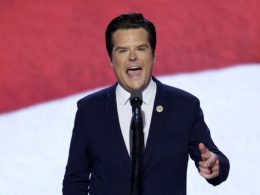This article is an on-site version of our Moral Money newsletter. Premium subscribers can sign up here to get the newsletter delivered three times a week. Standard subscribers can upgrade to Premium here, or explore all FT newsletters.
Visit our Moral Money hub for all the latest ESG news, opinion and analysis from around the FT
Hello from New York. The consequences of Donald Trump’s “brave new world” are starting be thought through. Those in the clean energy and environmental, social and governance investing sectors are coming to terms with the upheaval they are likely to face over the next four years.
For today’s edition, Simon and I have written on the themes we’ll be keeping a close eye on throughout the Trump transition and during the Republican’s second stint in the White House. If you have thoughts about what to expect, or how your business is responding, please email us at moralmoneyreply@ft.com. — Patrick Temple-West
US environmental and social policy
Four things to watch in Trump’s second term
1. Environmental deregulation
Trump’s return to the White House is almost certain to bring with it deregulation at the Environmental Protection Agency. During his first term, Trump’s EPA cut rules on how often oil-and-gas companies were required to monitor their wells for methane leaks, and relaxed other regulations on the gas responsible for up to 30 per cent of global warming.
Joe Biden’s administration bolstered emission reduction efforts with its 2021 Methane Emissions Reduction Action Plan, but the oil-and-gas industry is well prepared to aid Trump in attacking existing regulations. In October, the Washington Post reported that oil lobbyists were already planning to go after taxes and fees on methane emissions.
In it’s Project 2025 policy roadmap, the Trump-linked conservative Heritage Foundation think-tank recommended a plethora of cuts to environmental rules. Although Trump tried to distance himself from Project 2025 on the campaign trail, he’s likely to consider its proposals to eliminate dozens of environmental protections and green subsidies, including energy efficiency standards for appliances and carbon capture and storage programmes.
A host of other new Biden-era regulations may also face the chopping block. In March, the EPA announced new pollution standards for cars, which it said would reduce light automotive greenhouse gas emissions by 50 per cent between 2026 and 2032. In April, the agency set stricter emissions standards for coal and natural gas plants.
All of Trump’s potential deregulation will put an onus on environmental advocacy groups to fight his administration in court. The Natural Resources Defense Council sued the first Trump administration almost weekly.
“The Trump campaign and Project 2025 have laid out a radical agenda” that is likely to serve “the oil barons who funded that campaign”, Ed Yoon, chief external affairs officer at the NRDC, told Moral Money. “The NRDC has been preparing for this possibility for months, and our lawyers and advocates are ready to fight any illegal actions.” (Patrick Temple-West)
2. The impact on corporate America
For all the ink spilled over the Securities and Exchange Commission’s unprecedented climate disclosure rule since its announcement in March, it is unlikely to ever go into effect. Even though the rule was a watered-down version of earlier proposals, it was still deemed too onerous by the Chamber of Commerce and is almost certain to be repealed once Trump takes office. The incoming president has vowed to fire SEC head Gary Gensler on his first day in office.
These tensions open the door further for the International Sustainability Standards Board (ISSB) to be the global standard for climate reporting, said Evan Williams, a vice-president at the US Chamber of Commerce, on a call with investment bank Jefferies on Wednesday.
“The ISSB has been doing great work and has been working hard to try to get the Europeans off of their incredibly burdensome regulatory approach while also getting the US marketplace to consider voluntary adoption,” Williams said.
Countries including Brazil have adopted ISSB requirements for companies and other countries, including Japan and the UK, have plans to adopt or align with it. The EU, meanwhile, has introduced its own set of sustainability reporting standards, which require further disclosure of corporate environmental and social impacts.
The US has not yet introduced reporting rules of this sort. If the SEC drops work on this front under Trump, the country may become a notable outlier in its lack of climate disclosure requirements.
This will feed into wider questions over US companies’ approach to climate and sustainability issues. Facing accusations from Republican politicians and state officials of “woke” ideology and efforts to undermine the US fossil fuel industry, some companies have been getting quieter in their public approach to these issues, or cutting back efforts to reduce carbon emissions. Vanguard and other US firms have withdrawn from the climate-focused financial industry body, the Glasgow Financial Alliance for Net Zero (Gfanz). The incentives for further “greenhushing” could become supercharged with Trump in the White House.
On social issues, Biden’s SEC never finished human capital rules that would have required companies to publish more data about their workforce — so it’s unlikely those will ever see the light of day. Well before the election was called for Trump, companies were attacked by conservative activists for their diversity, equity and inclusion (DEI) policies. As a result, some have been scaling back such programmes. (Patrick Temple-West)
3. What happens to the IRA?
If Trump wants to repudiate his predecessor’s legislative legacy, the most obvious target is the Inflation Reduction Act. Signed into law in August 2022, the IRA offered huge tax credits for a wide range of clean energy investments, with strong support for domestic manufacturing.
Clean energy entrepreneurs and investors have hailed the IRA as a transformational boost to their sector. In contrast, Trump has repeatedly attacked the law as part of what he calls the “new green scam”. In September, he vowed to rescind “all unspent funds” under the IRA.
The termination of this fiscal support would deal a major financial blow to the clean energy sector. In the 24 months after the IRA passed Congress, investments in US clean energy manufacturing and deployment amounted to $493bn, up from $288bn in the prior two-year period, according to a report by Rhodium Group and the Massachusetts Institute of Technology.
The expected value of tax credits awarded over the legislation’s planned 10-year life was initially estimated by the White House at $369bn, but subsequent forecasts have been much higher: Goldman Sachs, for example, estimated that the total value of the tax credits would amount to $1.2tn.
Short of stopping payouts altogether, Trump could tighten the requirements necessary to receive the tax benefits. Vice president-elect JD Vance has proposed overhauling the law to eliminate tax credits for electric vehicles, and replace them with credits for petrol-powered cars.
Yet it may prove politically expedient for Trump to let most of the money keep flowing. The IRA’s support for US manufacturing broadly fits with a plank of his economic agenda. Moreover, roughly three-quarters of the investment catalysed by the IRA has been in Republican states, prompting 18 Republican lawmakers to issue a public appeal for its retention. (Simon Mundy)
4. How will COP cope?
Trump’s election victory comes at a hugely awkward moment for the international effort to address climate change. On Monday, negotiators from nearly every nation will gather in Azerbaijan for the UN COP29 summit, where there will be a heavy focus on reaching a new target for international climate finance provided by wealthy nations.
As the world’s largest economy, the US has a crucial role to play in those discussions. But it will be represented in Baku by diplomats from an administration that has under two months left to run — acting in the knowledge that any commitments they make may well be abandoned in short order under Trump.
“We should never give money anymore without the hope of a payback, or without ‘strings’ attached,” Trump wrote on his Truth Social platform in February. “The United States of America should be ‘stupid’ no longer!”
Trump announced the US withdrawal from the landmark Paris agreement in the first year of his first term as president — though that decision didn’t take legal effect until near the end of his term, and it was swiftly reversed by Biden. Trump’s team has said it will withdraw from the Paris accord again — and has reportedly considered pulling out of the UN climate process altogether.
It’s also worth considering what Trump’s return could mean for efforts to increase climate finance at the World Bank, where the US is the biggest shareholder. World Bank head Ajay Banga has promised to provide greater support for green development and climate resilience in developing nations — following four years under his predecessor, Trump appointee David Malpass, who was accused by critics of not prioritising these areas.
In Baku, we’ll get a sense of how other nations respond to Trump’s impending return — whether they’ll step up their work on climate change to counterbalance Trump’s effect on US policy, or use it as an excuse to scale back their own efforts. (Simon Mundy)
Smart reads
Power play What kind of capitalism does Donald Trump believe in?
Jet set Carbon emissions from private jets have risen almost 50 per cent in four years.
Going quiet Why has the UK government stopped talking about its “Green Prosperity Plan”?
Windfall Hedge funds running short bets on renewable energy companies have made big profits from Trump’s election victory.
Source link









